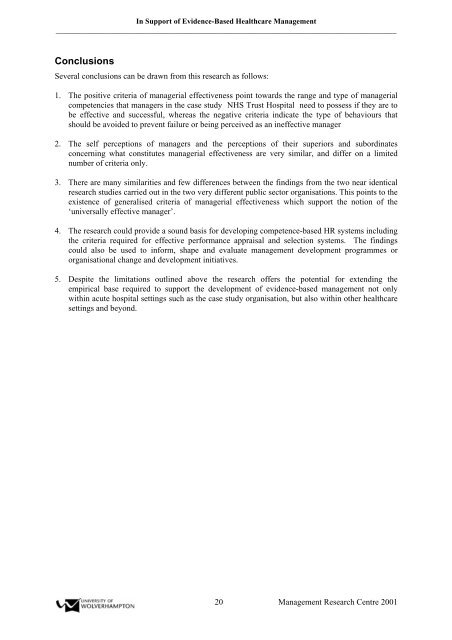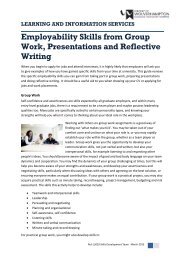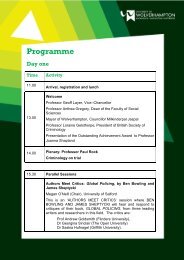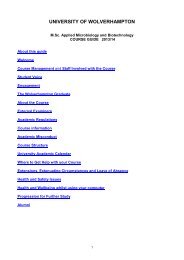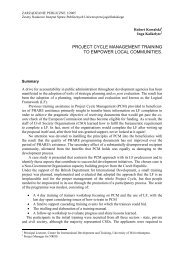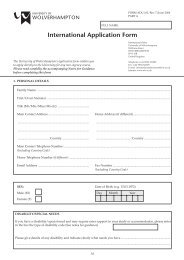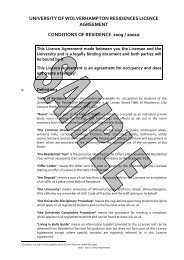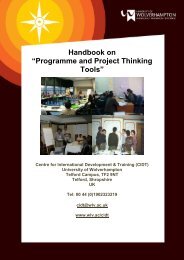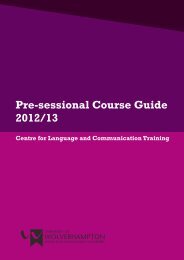<strong>In</strong> <strong>Support</strong> <strong>of</strong> <strong>Evidence</strong>-<strong>Based</strong> <strong>Healthcare</strong> <strong>M<strong>an</strong>agement</strong>_________________________________________________________________________________________ConclusionsSeveral conclusions c<strong>an</strong> be drawn from this research as follows:1. The positive criteria <strong>of</strong> m<strong>an</strong>agerial effectiveness point towards the r<strong>an</strong>ge <strong>an</strong>d type <strong>of</strong> m<strong>an</strong>agerialcompetencies that m<strong>an</strong>agers in the case study NHS Trust Hospital need to possess if they are tobe effective <strong>an</strong>d successful, whereas the negative criteria indicate the type <strong>of</strong> behaviours thatshould be avoided to prevent failure or being perceived as <strong>an</strong> ineffective m<strong>an</strong>ager2. The self perceptions <strong>of</strong> m<strong>an</strong>agers <strong>an</strong>d the perceptions <strong>of</strong> their superiors <strong>an</strong>d subordinatesconcerning what constitutes m<strong>an</strong>agerial effectiveness are very similar, <strong>an</strong>d differ on a limitednumber <strong>of</strong> criteria only.3. There are m<strong>an</strong>y similarities <strong>an</strong>d few differences between the findings from the two near identicalresearch studies carried out in the two very different public sector org<strong>an</strong>isations. This points to theexistence <strong>of</strong> generalised criteria <strong>of</strong> m<strong>an</strong>agerial effectiveness which support the notion <strong>of</strong> the‘universally effective m<strong>an</strong>ager’.4. The research could provide a sound basis for developing competence-based HR systems includingthe criteria required for effective perform<strong>an</strong>ce appraisal <strong>an</strong>d selection systems. The findingscould also be used to inform, shape <strong>an</strong>d evaluate m<strong>an</strong>agement development programmes ororg<strong>an</strong>isational ch<strong>an</strong>ge <strong>an</strong>d development initiatives.5. Despite the limitations outlined above the research <strong>of</strong>fers the potential for extending theempirical base required to support the development <strong>of</strong> evidence-based m<strong>an</strong>agement not onlywithin acute hospital settings such as the case study org<strong>an</strong>isation, but also within other healthcaresettings <strong>an</strong>d beyond.20 <strong>M<strong>an</strong>agement</strong> Research Centre 2001
<strong>In</strong> <strong>Support</strong> <strong>of</strong> <strong>Evidence</strong>-<strong>Based</strong> <strong>Healthcare</strong> <strong>M<strong>an</strong>agement</strong>_________________________________________________________________________________________ReferencesAxelsson, R.(1998) Towards <strong>an</strong> <strong>Evidence</strong> <strong>Based</strong> Health Care <strong>M<strong>an</strong>agement</strong> <strong>In</strong>ternational Journal <strong>of</strong>Health Pl<strong>an</strong>ning <strong>an</strong>d <strong>M<strong>an</strong>agement</strong> 13(4) pp. 307-317.Alimo-Metcalfe, B. (1998) The use <strong>of</strong> 360 degree feedback for leadership development <strong>In</strong>ternationalJournal <strong>of</strong> Selection <strong>an</strong>d Assessment 6(1) pp.35-44.Atwater, L. & Yammarino, F. (1992) Does self-other agreement on leadership perceptions moderatethe validity <strong>of</strong> leadership <strong>an</strong>d perform<strong>an</strong>ce predictions? Personnel Psychology 45(1) pp. 141-164.Altm<strong>an</strong>, D. G. (1994) The Sc<strong>an</strong>dal <strong>of</strong> Poor Medical Research British Medical Journal 308 pp. 283-284.Bass, B. & Yammarino, F. (1991) Congruence <strong>of</strong> self <strong>an</strong>d others’ leadership ratings <strong>of</strong> naval <strong>of</strong>ficersfor underst<strong>an</strong>ding successful perform<strong>an</strong>ce Applied Psychology: An <strong>In</strong>ternational Review 40(4) pp.437-454.Bennett, R. D. & L<strong>an</strong>gford, V. (1983) M<strong>an</strong>agerial Effectiveness, <strong>In</strong>: A. P. O. Williams (Ed) UsingPersonnel Research (Aldershot: Gower Press) pp. 61-84.Bury, T. & Mead, J. (1998) <strong>Evidence</strong>-based <strong>Healthcare</strong>: a practical guide for therapists (Oxford:Butterworth-Heinem<strong>an</strong>n).Cochr<strong>an</strong>e, A (1972) Effectiveness <strong>an</strong>d Efficiency: r<strong>an</strong>dom reflections on health services (London:Nuffield Trust).Comrey, A. L (1973) A first Course in Factor Analysis (London: Academic Press).Fl<strong>an</strong>ag<strong>an</strong>, H. (1990) A study <strong>of</strong> m<strong>an</strong>agerial effectiveness with particular reference to generalm<strong>an</strong>agers in the NHS, MSocSc ( ModeII Research) Thesis University <strong>of</strong> Birmingham.Fl<strong>an</strong>ag<strong>an</strong>, H. & Spurgeon, P. (1996) Public Sector M<strong>an</strong>agerial Effectiveness: theory <strong>an</strong>d practice inthe National Health Service (Buckingham: Open University Press).Fl<strong>an</strong>ag<strong>an</strong>, J. C. (1954) The Critical <strong>In</strong>cident Technique Psychological Bulletin 51 pp. 327-58.Foti, R. (1990) The role <strong>of</strong> cognitive categories in supervisor versus self-ratings, Paper presented atthe Annual Meeting <strong>of</strong> the Academy <strong>of</strong> <strong>M<strong>an</strong>agement</strong>, S<strong>an</strong> Fr<strong>an</strong>cisco, August.Gray, J. A. M. (1997) <strong>Evidence</strong>-based <strong>Healthcare</strong>: How to Make Health Policy <strong>an</strong>d <strong>M<strong>an</strong>agement</strong>Decisions (Edinburgh: Churchill Livingstone).Ham, C., Hunter, D. & Robinson, R.(1995) <strong>Evidence</strong>-based Policy Making British Medical Journal310 pp. 71-72.Hamlin, R. G (1988) The criteria <strong>of</strong> m<strong>an</strong>agerial effectiveness within secondary schools, CollectedOriginal Resources in Education 12(1) Published MPhil Thesis.Hamlin, R. G & Reidy, M (1997) Effecting Ch<strong>an</strong>ge in <strong>M<strong>an</strong>agement</strong> Culture Strategic Ch<strong>an</strong>geJournal Special Edition (December) pp. 435-450.Hamlin R. G., Reidy, M & Stewart, J. (1998) Bridging the HRD Research–Practice Gap throughPr<strong>of</strong>essional Partnerships Hum<strong>an</strong> Resource Development <strong>In</strong>ternational 1(3) pp. 273-290.Hamlin, R. G. & Stewart, J. (1998) <strong>In</strong> <strong>Support</strong> <strong>of</strong> <strong>Evidence</strong>-<strong>Based</strong> Hum<strong>an</strong> Resource DevelopmentPractice, Paper presented at the L<strong>an</strong>caster-Leeds Collaborative Conference: Emergent Fields in<strong>M<strong>an</strong>agement</strong>- Connecting Learning <strong>an</strong>d Critique Leeds University, July.Herriot, P. (1988) M<strong>an</strong>agerial Assessment: the research evidence, <strong>In</strong>: W. Hirsch & S. Bev<strong>an</strong> (Eds)What Makes a M<strong>an</strong>ager? <strong>In</strong> Search <strong>of</strong> a L<strong>an</strong>guage for <strong>M<strong>an</strong>agement</strong> Skills IMS Report No 144,<strong>In</strong>stitute <strong>of</strong> M<strong>an</strong>power Studies, University <strong>of</strong> Sussex.21 <strong>M<strong>an</strong>agement</strong> Research Centre 2001


